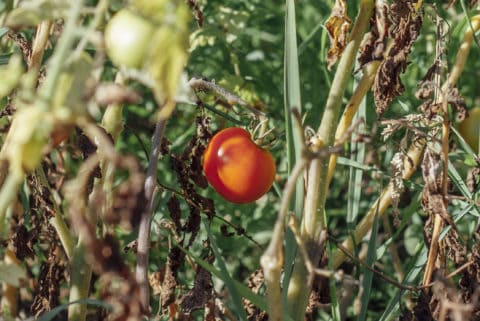Although fall has officially begun, one community garden is still benefiting from summer while offering opportunities to grow food, friendships and a chance to better understand food sovereignty and what it means to live sustainably.
In 2016, five community gardens at the University of Saskatchewan were expanded due to a continued partnership between the Office of Sustainability and PotashCorp. One such location, the McEown Community Garden, was able to accommodate 107 gardeners, nearly double the 60 gardeners who worked in 2015.

The McEown Community Garden offers students a chance to grow food and friendships in a beautiful community setting.
Jebunnessa Chapola, a graduate student in women’s, gender and sexuality studies and the cultural co-ordinator for the community garden, reflects on the past year as the harvest comes to a close.
“It’s a very lively space, you can feel the power of the community and the power of the garden; if you want to experience it, you need to come around,” Chapola said.
Throughout 2016, Chapola created a calendar filled with events geared at connecting the community and promoting learning and leadership. She sees deeper benefits for those involved in the garden and hopes to see continued success in years to come. All students living in residence over the summer months are able to apply for space in the McEown Community Garden, which is located beside Souris Hall in McEown Park. There are designated plots for single students as well as larger plots for families in residence.
“Once everything is divided, we hand it over to the gardeners. It becomes their responsibility, they can plant what they want and then in between, we can offer help and consultation,” Chapola said.
She sees benefits from the garden directly in her own life, from providing nutritious food for her family to finding a place to relax and de-stress. She believes those with the opportunity to participate in community gardening should take advantage of it.
“There is too much stress, [students] don’t know how to deal with it all, but I would say that some relief is right outside their window — open up and have a look,” Chapola said.
Chapola organized art projects for the children of students in residence, a competition to clean up litter around the garden and many educational sessions regarding the nature of gardening. There were also sessions sharing Aboriginal culture and history, which Chapola believes are important to understand in relation to the land we inhabit.
“I met so many individuals through the garden and there were so many opportunities to share stories, share pain and laughter and happiness — this space is not land only, it’s not only a place for harvesting, it’s beyond that,” Chapola said.
She emphasizes that community building has been at the core of her efforts as cultural co-ordinator and remarks that, while some events were not well attended, others were very successful in her opinion.
“At the end of the summer we had a cross-cultural harvest community potluck. It’s always a very good turnout. All of the gardeners bring their fresh harvest and we share food. This year there were also cultural performances,” Chapola said.
Chapola has also organized a field trip to the national historic site Wanuskewin on Oct. 2, where gardeners will learn about many Indigenous practices.
Looking towards the year to come, Chapola feels there is still more that can be improved in the McEown Community Garden.
“There should be more sharing. I don’t want to say that that is not happening — it is — but I think we can improve that and it’ll be more rewarding. We as a society are very capitalized people, and we don’t often easily give into the sharing concept, and that’s a challenge,” Chapola said.
She believes that at the heart of it all, community gardening is a chance to grow not only what you need to feed your body, but also your soul.
“It is an informal education space, which is not always recognized or seen to be valid. People don’t see how this kind of informal education can be productive or rewarding, how it can be helpful to build up your personality or your inner side.”
—
Emily Migchels
Photos: Jeremy Britz / Photo Editor
Leave a Reply